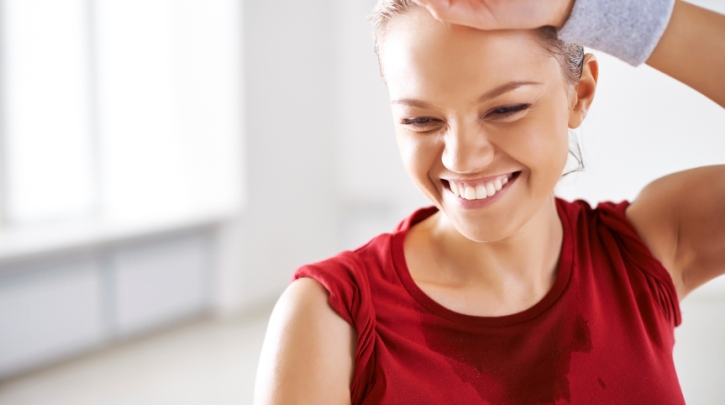
11 Aug Why Am I Sweating So Much?
It might not seem like a big deal from a distance — a damp brow on a sunny day, drenched underarms after an intense exercise class, moist palms before giving an important presentation — things we all experience from time to time. Some of us even look forward to sweating it out in a sauna or steam room. But for those who sweat profusely, this normal bodily function can be a nightmare. Excessive sweating isn’t just inconvenient; it can be uncomfortable and embarrassing, and in severe cases, it can negatively impact quality of life. If you’re concerned about your level of sweating, it may be time for a consult. Let’s look at some of the reasons why you may sweat easily and what treatment options might be available.
WHY DO WE SWEAT?
Sweating is a natural process that keeps us from overheating. When we sweat, the moisture collects on our skin and then evaporates, cooling us down. Sweating can also occur as a result of hormonal changes, drinking alcohol or caffeinated beverages, eating spicy foods, or experiencing strong emotions like anger, stress or embarrassment. As icky or irritating as it might feel in the moment, sweating has benefits that go beyond regulating our body temperature:
WHY DO SOME PEOPLE NATURALLY SWEAT MORE THAN OTHERS?
Picture the end of your favourite fitness class. Some people are dripping as they exit the studio, while others look as fresh as they did when they entered. What’s going on? Various factors affect how much or how little someone sweats:
- Age
- Sex
- Genetics
- Fitness level
- Body size
- Health conditions
- Diet
Remember, there’s a range of ‘normal’ when it comes to perspiration. What seems like a lot for one person might be par for the course for someone else — yet another way our bodies are beautifully unique. The question is, how much sweat is too much sweat?
WHAT ARE THE SIGNS OF EXCESSIVE SWEATING?
There’s functional sweat and then there’s “I’m just trying to get through the day without having to change my shirt at work” sweat. Telltale signs of excessive sweating include:
- Sweating outside of normal stimuli
- Sweating that visibly soaks through clothing
- Sweaty palms that make everyday tasks difficult (e.g. driving or using a mobile phone)
- Sweating that causes anxiety in social or professional settings
- Sweating that causes irritating skin conditions, such as fungal overgrowth
- Sweaty hands that leave marks on paper and fabrics
- Sweaty feet that ruin footwear
WHAT MIGHT BE CAUSING MY EXCESSIVE SWEATING?
We’ve mentioned some possible culprits already, but let’s dive deeper into a few more reasons for excessive sweating.
HORMONAL CHANGES
Increased sweating may be due to hormonal fluctuations or a hormonal imbalance. Women are especially prone to experiencing this during pregnancy and menopause, when hot flashes, flushing and night sweats are common. Postpartum sweating can also occur.
MEDICAL CONDITIONS OR MEDICATIONS
A variety of medical conditions, such as diabetes, infection, fever, an overactive thyroid or cancer, are associated with excessive sweating. Increased sweating can also be a side effect of medications, including some antidepressants, birth control pills, migraine medications, opioids, thyroid-regulating drugs and others.
DIET
Certain things we eat and drink are known to trigger perspiration. It’s not uncommon to get a little clammy during a meal of hot, spicy foods, or while downing caffeinated drinks or alcohol. There’s even a name for the dampness that occurs soon after ingesting food: gustatory sweating.
MENTAL HEALTH
How we feel mentally and emotionally can impact our body temperature, especially if we’re stressed or anxious. These challenging feelings raise our body temperature, which in turn makes us more likely to sweat. Emotions like fear, anger and embarrassment can be triggers as well.
HYPERHIDROSIS
Hyperhidrosis is a condition caused by the overstimulation of sweat glands by nerves. For people with hyperhidrosis, the sweat glands produce more perspiration than physiologically required, even when there is no normal trigger (such as heat, physical exertion or stress) present. Hyperhidrosis is classified as primary hyperhidrosis or secondary hyperhidrosis.
ARE THERE ANY EFFECTIVE EXCESSIVE SWEATING TREATMENTS?
The first line of defence against excessive sweating is over-the-counter antiperspirants. If your symptoms are mild to moderate, a high-strength antiperspirant may be enough to keep you dry throughout the day. If OTC solutions are insufficient, a doctor may recommend prescription-strength antiperspirants, topical gels or medicated wipes that reduce perspiration. Specific products are available for different body areas. Oral medications are used in some cases. Clinical treatments offer the strongest protection against excessive sweating which includes anti-wrinkle injections to treat hyperhidrosis. The treatment works by temporarily preventing the nerves that control sweating from stimulating the sweat glands. There is no downtime after the procedure, and the results can last six to 12 months before the injections must be repeated.


